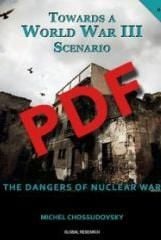15 Seconds Until Nuclear Armageddon
As war wreaks hell in Ukraine—and the threat of a nuclear confrontation between superpowers continues to intensify—NATO is in the process of prepping for the end of the world.

All Global Research articles can be read in 51 languages by activating the Translate Website button below the author’s name.
To receive Global Research’s Daily Newsletter (selected articles), click here.
Follow us on Instagram and Twitter and subscribe to our Telegram Channel. Feel free to repost and share widely Global Research articles.
***
“When militarism is addressed as a psychosocial disease, the absurd irrationality of its symptoms is clearly exposed.”
These words are from a 1992 essay by N. Arther Coulter published in a journal called Medicine and War. Who would have guessed? They’re as relevant now as they were three decades ago.
God bless Armageddon.
As war wreaks hell in Ukraine—and the threat of a nuclear confrontation between superpowers continues to intensify—NATO is in the process of prepping for the end of the world. It’s an annual two-week training event called Steadfast Noon—a nuclear practice run that gives European flight crews a chance to practice loading and dropping “non-strategic” nuclear bombs. Russia is expected to conduct its own annual nuclear drill, known as Grom (that is, Thunder), soon as well.
I can’t read about this without summoning what I call “the big why?” from deep within. Endless resources are devoted annually to nuclear deterrence, a.k.a., the big bluff: “If you mess with me, you’re gonna get it.” The point, allegedly, is to prevent war, which is absolutely paradoxical in a global political system based on the psychosocial disease of militarism, i.e., the pursuit of national interest and the maintenance of safety primarily via force and violence.
No matter that this is the nuclear age, that force and violence could—oh so easily—go too far and wreak horror on everyone. The preparation for nuclear war continues unabated, while the voices of opposition remain merely cries from the political margins. There’s no actual “debate” here, just a lot of powerless anguish, or so it seems.
For instance, two years ago an open letter, signed by 56 former political leaders (including former prime ministers) of 20 NATO countries, as well as Japan and South Korea, was released to the world, pleading to current NATO countries—to all the nuclear-armed nations—to sign the Treaty on the Prohibition of Nuclear Weapons, which the U.N. passed in 2017 by a vote of 122-1. The nations represented by the letter’s signatories have, of course, totally ignored the treaty, which was ratified last year, making nuclear weapons technically “illegal,” which seems to mean nothing at all.
The letter concludes thus: “With close to 14,000 nuclear weapons located at dozens of sites across the globe and on submarines patrolling the oceans at all times, the capacity for destruction is beyond our imagination. All responsible leaders must act now to ensure that the horrors of 1945 are never repeated. Sooner or later, our luck will run out—unless we act. The nuclear weapon ban treaty provides the foundation for a more secure world, free from this ultimate menace. We must embrace it now and work to bring others on board. There is no cure for a nuclear war. Prevention is our only option.”
Stunning words! They were signed by former leaders of the following countries: Albania, Belgium, Canada, Croatia, the Czech Republic, Denmark, Germany, Greece, Hungary, Iceland, Italy, Japan, Latvia, the Netherlands, Norway, Poland, Portugal, Slovakia, Slovenia, South Korea, Spain and Turkey.
They also wrote: “. . .we appeal to current leaders to advance disarmament before it is too late.”
“We appeal . . .?” And suddenly the whole letter crawled back into the political margins. These were former prime ministers, former defense ministers, speaking the deepest possible political truth, but seemingly they had no more power to bring about the change—global nuclear disarmament—than I do.
Behind the formal language was a simple plea: “Come on, guys. Nuclear militarism doesn’t work. You know it as well as we do.” But nothing has changed. Perhaps only when you’re no longer in power do you become free of the psychosocial disease of militarism. And thus “nuclear deterrence,” along with enormous, bloated military budgets, remains the way of the developed world.
Militarism—including nuclear militarism—remains the way of the world, accompanied by an enormous shrug. This being the case, it strikes me as appropriate to revisit fifteen seconds in the life of Stanislav Petrov, a lieutenant colonel of the Soviet Air Defense Forces, who, on Sept. 26, 1983, essentially saved the world from nuclear war.
He was on duty at the command center outside Moscow where nuclear threat was monitored. Several hours into his shift that morning, the alarm went off. Oh my God! Computers immediately warned that the U.S. had just launched five ICBMs at the Soviet Union.
“For fifteen seconds, we were in a state of shock,” he later said. These were fifteen seconds in which the fate of humanity—your fate, my fate—were up for grabs. As the New York Times noted, this was a deeply tense period of the Cold War. Three weeks earlier, the Soviet Union had shot down a Korean Air Lines commercial flight flying over Soviet territory, killing all 269 people on board. And President Reagan had recently declared that the Soviet Union was an “evil empire” and refused to freeze the arms race. Uh oh.
According to protocol, Petrov should have reported the alert up the military chain of command, with nuclear retaliation the likely result. But the computer warning seemed odd. It indicated that only five missiles had been launched, which made no sense. Why so few? In those fifteen seconds, as he recovered from his shock and pulled himself together, he studied the flashing maps. His gut instinct was: no, this isn’t real. It’s a false alarm. The Times wrote:
“As the tension in the command center rose—as many as 200 pairs of eyes were trained on Colonel Petrov—he made the decision to report the alert as a system malfunction.”
And yes, his gut instinct proved accurate. Some clarity and sanity well down the military chain of command kept the world out of nuclear war. That time.
From Common Dreams: Our work is licensed under Creative Commons (CC BY-NC-ND 3.0). Feel free to republish and share widely.
*
Note to readers: Please click the share buttons above. Follow us on Instagram and Twitter and subscribe to our Telegram Channel. Feel free to repost and share widely Global Research articles.
Robert Koehler is an award-winning, Chicago-based journalist and nationally syndicated writer. Koehler has been the recipient of multiple awards for writing and journalism from organizations including the National Newspaper Association, Suburban Newspapers of America, and the Chicago Headline Club. He’s a regular contributor to such high-profile websites as Common Dreams and the Huffington Post. Eschewing political labels, Koehler considers himself a “peace journalist. He has been an editor at Tribune Media Services and a reporter, columnist and copy desk chief at Lerner Newspapers, a chain of neighborhood and suburban newspapers in the Chicago area. Koehler launched his column in 1999. Born in Detroit and raised in suburban Dearborn, Koehler has lived in Chicago since 1976. He earned a master’s degree in creative writing from Columbia College and has taught writing at both the college and high school levels. Koehler is a widower and single parent. He explores both conditions at great depth in his writing. His book, “Courage Grows Strong at the Wound” (2016). Contact him or visit his website at commonwonders.com.
Featured image is from ICAN/Aude Catimel
 “Towards a World War III Scenario: The Dangers of Nuclear War”
“Towards a World War III Scenario: The Dangers of Nuclear War”
by Michel Chossudovsky
Available to order from Global Research!
ISBN Number: 978-0-9737147-5-3
Year: 2012
Pages: 102
PDF Edition: $6.50 (sent directly to your email account!)
Michel Chossudovsky is Professor of Economics at the University of Ottawa and Director of the Centre for Research on Globalization (CRG), which hosts the critically acclaimed website www.globalresearch.ca . He is a contributor to the Encyclopedia Britannica. His writings have been translated into more than 20 languages.
Reviews
“This book is a ‘must’ resource – a richly documented and systematic diagnosis of the supremely pathological geo-strategic planning of US wars since ‘9-11’ against non-nuclear countries to seize their oil fields and resources under cover of ‘freedom and democracy’.”
–John McMurtry, Professor of Philosophy, Guelph University
“In a world where engineered, pre-emptive, or more fashionably “humanitarian” wars of aggression have become the norm, this challenging book may be our final wake-up call.”
-Denis Halliday, Former Assistant Secretary General of the United Nations
Michel Chossudovsky exposes the insanity of our privatized war machine. Iran is being targeted with nuclear weapons as part of a war agenda built on distortions and lies for the purpose of private profit. The real aims are oil, financial hegemony and global control. The price could be nuclear holocaust. When weapons become the hottest export of the world’s only superpower, and diplomats work as salesmen for the defense industry, the whole world is recklessly endangered. If we must have a military, it belongs entirely in the public sector. No one should profit from mass death and destruction.
–Ellen Brown, author of ‘Web of Debt’ and president of the Public Banking Institute

